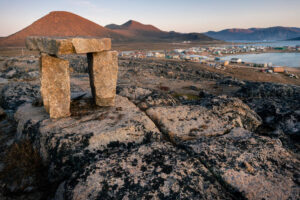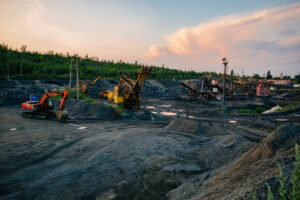
The Role of Remote Camp Managers in Creating Community and Cohesion
Remote camp managers are the heartbeat of operations in companies operating in rugged and isolated environments such as those in

Implementing sustainable waste management strategies help organisations reduce, reuse, and recycle to protect the environment we work in and ensure that operations leave a positive environmental legacy. In particular, extractive industries such as mining, oil and gas sectors, because they operate in remote locations characterised by their natural beauty and ecological sensitivity, demand responsible waste management practices to preserve the pristine landscapes and protect fragile ecosystems.
Waste management in remote locations presents unique challenges. Limited access to recycling facilities and proper disposal sites, as well as the transportation logistics, can hinder traditional waste management practices. Moreover, the fragility of remote ecosystems demands a heightened sense of responsibility in handling waste to minimize ecological impact.
It’s critical for remote camp facilities to prioritize waste reduction at the source by adopting specific environment-friendly activities. Through careful planning and collaboration with suppliers, creative ways can be established to minimize unnecessary packaging and single-use items. By emphasizing reusable containers and encouraging mindful consumption practices among personnel, the overall volume of waste generated in remote locations can be significantly reduced.
While recycling opportunities may be limited in remote areas, partnerships with local recycling facilities and organizations can greatly help maximize recycling efforts. Identifying recyclable materials and implementing comprehensive recycling initiatives that align with the available resources in the region, not only curtails the volume of waste generated but also reduces disposal cost.

Composting is a powerful tool in sustainable waste management. Organic waste, such as food scraps and biodegradable materials, is transformed into nutrient-rich compost, which can be used to nourish the soil and promote plant growth. As a matter of priority, remote camp systems should look into implementing composting initiatives to minimize landfill waste and foster a circular approach to waste management.
In some remote locations, waste-to-energy solutions can be viable alternatives to traditional waste management. It’s imperative that remote facility services explore innovative technologies that convert waste into renewable energy sources, reducing the environmental impact of waste disposal while harnessing energy for operational needs.
Sustainable waste management is a collective effort that begins with education and empowerment. Investing in training programs to raise awareness among personnel about the importance of responsible waste management should be part of a comprehensive waste management process. By fostering a culture of environmental stewardship, we empower our workforce to actively participate in waste reduction and recycling initiatives.
To continuously improve our waste management practices, remote camp systems should employ monitoring and measurement systems to assess their environmental impact. By tracking waste generation, recycling rates, and landfill diversion, areas for improvement can be identified and strategies to enhance sustainability efforts can be implemented.

Sustainable waste management in remote facility locations is essential for preserving the natural beauty and ecological integrity of these pristine areas. Through responsible waste reduction, recycling initiatives, composting, and innovative waste-to-energy solutions, remote facilities in extractive industries can embrace the challenge of minimising environmental impact. By educating our workforce and measuring our impact, we ensure that our operations in remote locations leave a positive environmental legacy and protect the places we work in for generations to come.
Domco Group of Canada Limited is one of the most trusted and well respected remote sites service providers in Canada. Fully Canadian and independently owned, Domco has been in operation since 1945. We offer integrated remote site solutions, including a nutritious and well planned menu cycle, long-term relationship building, and deep Canadian roots in remote locations with Aboriginal communities.
Let us take you through some key advantages that set us apart.

Remote camp managers are the heartbeat of operations in companies operating in rugged and isolated environments such as those in

The importance of sustainable food practices in remote camp operations highlights both innovative strategies to minimize waste as well as

Indigenous communities hold a large body of indigenous knowledge passed down through the generations. These customs, traditions, history, spiritual beliefs

Technology advancements deliver cutting-edge solutions that streamline operations, optimize resource management, and provide seamless connectivity to remote locations. Let’s take

In recent years, the farm-to-table movement has gained popularity as people increasingly seek fresh, locally sourced ingredients for their meals.

Flexible turnkey camp solutions specializes in the operational management, maintenance, and overall running of mobile camps. They provide a complete

In primary industries, encouraging or promoting sustainable development is a delicate dance, especially within the context of Indigenous communities. Finding

Promoting a healthy work-life balance and providing opportunities for remote site recreation are essential for the overall well being and

The importance of responsible recycling and waste management cannot be overstated in remote work camps operating in vast and pristine

The importance of sustainable energy solutions in remote facilities has emerged as a crucial focus for the industry. Utilising renewable

Culinary experts in remote site food services take pride in offering carefully crafted menus that cater to the diverse tastes

Implementing sustainable waste management strategies help organisations reduce, reuse, and recycle to protect the environment we work in and ensure

Cultural sensitivity and being aware of the cultural differences and similarities of Indigenous communities are crucial when working in remote

Remote camp management comes with its own set of challenges. Working in remote locations requires meticulous planning, adaptable strategies, and

Let’s dive in on how Remote Facility Maintenance helps remote sites operate efficiently, ensuring that the business runs as efficiently
Domco Group of Canada Limited is one of the most trusted and well respected remote sites service providers in Canada. Fully Canadian and independently owned, Domco has been in operation since 1945. We offer integrated remote site solutions, including a nutritious and well planned menu cycle, long-term relationship building, and deep Canadian roots in remote locations with Aboriginal communities.
We will treat everyone with respect, honesty and integrity. We will foster an atmosphere of teamwork and strive for excellence in everything we do. We will find ways to innovate and do our utmost to deliver the highest standards of foodservice and facility management to remote location companies across Canada.
Other Office Locations: Vancouver, Yellowknife, Regina, Winnipeg, Montreal, Sept-Iles
